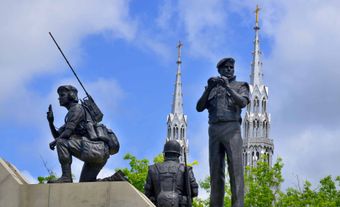Cet article a été initialement publié dans le magazine Macleans (22/05/1995)
He was a 12-year-old schoolboy in Paris when Germany surrendered to the Allies on May 8, 1945. Last week, half a century later, he stood at the Arc de Triomphe to celebrate both the Allied victory and a personal one. Twice defeated by Socialist François Mitterrand for the French presidency in the 1980s, conservative Paris Mayor Jacques Chirac, 62, finally proved successful in a runoff election on May 7, beating Mitterrand's heir and the first-round leader, Lionel Jospin. The next day, president-elect Chirac stood shoulder to shoulder with his outgoing political nemesis at ceremonies marking the 50th anniversary of the end of the Second World War in Europe. The ceremonies offered 78-year-old Mitterrand, who is dying of prostate cancer, an opportunity to bid his political farewell after 14 years in France's highest office. The festivities also provided Chirac with a unique international baptism before some 70 world leaders, including U.S. Vice-President Al Gore, German Chancellor Helmut Kohl and Prime Minister Jean Chrétien.
It has been a long, hard climb to the top for the tenacious Chirac. A protégé of former Gaullist president Georges Pompidou, who affectionately called him "the bulldozer," Chirac was first elected to the National Assembly in 1967 at the age of 34. He served in various cabinet posts until Pompidou's death in 1974, when he became premier under centrist president Valéry Giscard d'Estaing. That arrangement ended in 1976 when Chirac resigned, complaining that Giscard d'Estaing would not give him enough authority to combat unemployment and inflation. The following year, Chirac became mayor of Paris - an office he will relinquish before his inauguration this week.
In the 1981 presidential election, he ran against Giscard d'Estaing, splitting the right-wing vote and helping assure victory for Mitterrand. When the centre-right won the 1986 parliamentary elections, Chirac agreed to become prime minister in an unprecedented power-sharing arrangement with the Socialist president. Two years later, he again unsuccessfully challenged Mitterrand for the presidency. Frustrated, Chirac retreated to city hall, where he plotted last week's stunning comeback.
After nearly 30 years in politics, the private life of France's next president remains an enigma. Only in March did Chirac reveal that he and his wife, Bernadette, had adopted a Vietnamese refugee in 1979. (Anh Dao, 25, was married last year in a private ceremony conducted by Chirac in his capacity as mayor.) And his family has suffered tragedies about which he never speaks. His older daughter, Laurence, 36, a doctor, was critically injured in 1988 in an apparent suicide attempt. The husband of younger daughter Claude, 32, who is now Chirac's main media adviser, killed himself in 1993.
Secretiveness about his private life is just one part of the Chirac puzzle. As a politician, he has tried to be all things to all people. He has been, by turns, both an advocate and a critic of closer European ties. When he founded the Gaullist Rally for the Republic party in 1976, he suggested it should stand for "French-style Laborism," a reference to Britain's party of the left. Yet, when he became premier for the second time, in 1986, his platform was a Gallic version of Thatcherite conservatism. He privatized state firms, ended restraints on layoffs and abolished a wealth tax on the rich. In his latest incarnation, Chirac - whose campaign logo was an apple tree - presents himself as a crusader against poverty and unemployment.
In his first weeks in the Elysée Palace, Chirac will have to make several decisions that will set the tone for his presidency. Probably the most difficult will be whether to resume underground nuclear weapons testing - suspended in 1992 - on Mururoa atoll in French-controlled Polynesia. A resumption of testing would antagonize South Pacific nations and jeopardize prospects for a worldwide total nuclear test ban, currently under negotiation at the United Nations. Not to do so could call into question the reliability of France's arsenal and prevent the development of a new generation of warheads.
Meanwhile, Foreign Minister Alain Juppé, Chirac's likely prime minister, has said that France must decide within a few weeks whether to keep its 4,800 UN peacekeepers in the former Yugoslavia, where there is renewed fighting. And on the domestic front, Chirac must deal with the demands of angry labor unions, which are threatening strikes for higher wages at a time when the unemployment rate stands at a near-record 12.2 per cent - the highest in northern Europe.
Chirac's first foreign trip is almost certain to be a symbolic visit to Bonn to reaffirm the importance of the Franco-German partnership for the future of Europe. He will also visit Halifax next month to attend the Group of Seven world economic summit, hosted by Chrétien. Although the two men spoke briefly last week at VE-Day ceremonies in Paris, Chirac's advisers insisted that the demands of the presidential transition precluded a private meeting. That, at least, was the official explanation - although most analysts concluded that Chirac's unavailability was a deliberate snub stemming from a January visit to France by Quebec Premier Jacques Parizeau. At the time, Chirac said any government headed by him would be the first to recognize a sovereign Quebec if the province voted for independence in a referendum. Miffed, Chrétien retorted in Ottawa that the referendum had as much chance of passing as Chirac had of winning the French presidency. It was not the first time that someone had underestimated the power of "the bulldozer."
Maclean's May 22, 1995

 Partager sur Facebook
Partager sur Facebook Partager sur X
Partager sur X Partager par Email
Partager par Email Partager sur Google Classroom
Partager sur Google Classroom


